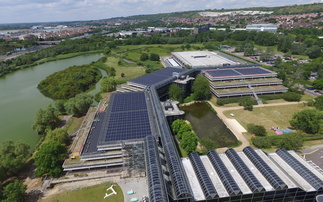NPD Solarbuzz reveals there are 215 schemes in the pipeline that are larger than 5MW in capacity
The future of more than 200 UK solar farms is hanging in the balance after the government last week announced surprise plans to change renewable energy subsidies, new figures have revealed.
The Department for Energy and Climate Change (DECC) wants to close the Renewable Obligation Certificate (ROC) regime to all solar power projects larger than 5MW in capacity from next April, claiming it fears the rapidly growing market will breach its ROC budget.
The controversial plans created shockwaves through the burgeoning industry, with many developers, such as Good Energy, confirming they were revisiting their solar investment plans as a result of the proposed reforms.
Now figures by NPD SolarBuzz have revealed that more than 200 solar farms could be affected by the proposals, which are currently subject to consultation. The analyst found that there are 215 schemes in the project pipeline larger than 5MW, only 10 of which are currently being installed. A further 114 projects have yet to secure consent and 91 schemes have planning permission, but need to reach financial close in order to proceed.
The government has said it still expects to see some of these projects completed because ROCs will remain open for developers that had already made "significant commitments" or had already secured a preliminary ROC agreement by 13 May 2014, when the consultation was unveiled. The proposals raise the prospect of a "grace period" whereby some projects could miss the April 2015 deadline, but still qualify for current levels of subsidies.
However, Finlay Colville, vice president at NPD Solarbuzz, said that while a number of projects are expected to proceed, the industry was less optimistic about the extent to which the current pipeline will be delivered, particularly given the vague definition put forward by the government as to what qualifies as a "significant commitment".
"The grace period – and conditions around it – is not offering much hope right now, and few are viewing this as an option," he told BusinessGreen. "It's not clear right now how many would qualify, but the industry is not currently shouting about the grace period option as being of any great value."
He said the schemes most at risk were those in the 5MW-30MW band, because they will be too large for ROCs after April 2015 if the government plans are confirmed, but could still face difficulties accessing subsidies through the replacement Contract for Difference (CfD) scheme. Critics of the CfD model from within the solar industry have long argued it is too complex for small-scale renewable energy developers to navigate, while the industry is also concerned that plans to require solar developers to compete for guaranteed price contracts through auctions could make it difficult for solar projects to secure support.
One industry insider suggested a handful of large developers may be able to navigate the CfD contracts and auctions, but warned that many smaller solar farm specialists would be effectively locked out of the market.
Colville identified 83 projects in the mid-sized 5MW-30MW category, which have already secured planning permission and will now be rushing to take advantage of the current RO scheme before the proposed cut-off date of next April. He predicted that about three quarters of these projects would be completed before the target date, meaning the remainder will have to hope they can take advantage of the government's proposed, but as yet unconfirmed, "grace period".
He also identified another 105 schemes in the 5MW-30MW catagory that have yet to secure planning approval, equating to 1.18GW of capacity in total. It remains to be seen how many, if any of these could meet the April 2015 deadline.
NPD Solarbuzz also identified a further 17 applications in the larger category of 30MW or above. Eight schemes already have consent to deliver a total capacity of 308MW, but another nine schemes have yet to secure planning permission.
Coleville predicted just a handful of these projects would be completed by the end of March 2015, while others would now be shelved. He added that the proposals would force developers to identify which projects are most likely to deliver the lowest costs, ensuring that they could potentially win a CfD auction that could see them compete for contracts with onshore wind farm developers and other solar farms.
"Developers need to decide quickly which projects can be fast-tracked for completion under ROCs before April 2015, which are viable under CfDs, and which should be terminated," he said.
DECC was formulating a response to the latest figures at the time of going to press. But government sources have insisted the proposed cuts are necessary to stop a surge in solar farm developments breaching the government's budget and putting upward pressure on energy bills. They have also argued that the proposed "grace period" will ensure that projects already in the pipeline have a chance of proceeding.
However, with the consultation on the government's proposals ongoing and concerns escalating across the industry that the coalition is privately committed to restricting the rollout of new projects, developers will be forgiven for worrying about the future of their solar farm pipelines.










